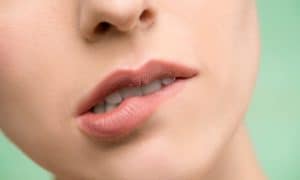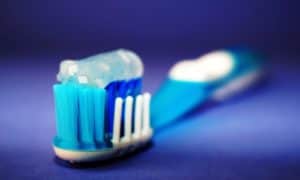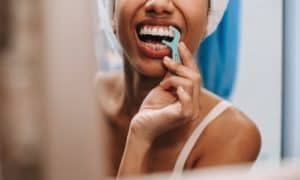
The Link Between Gum Disease & Colon Cancer
The study that examined the potential link between gum disease and colon cancer took several things into consideration – health, lifestyle, and pathology reports from routine colonoscopies. Those pathology results showed something interesting about those participants who had serrated polyps and conventional adenomas, the two types of intestinal lesions that can cause colon cancer, and who also had a history of gum disease.
Patients with a history of gum disease had:
But that’s not all. Patients who had lost four or more teeth, which is a very common side effect of gum disease, had a 20% increased risk of having a serrated polyp.
While this research does suggest a correlation between gum disease and colon cancer, the scientists did state that more research is needed to fully understand how oral health can affect gut health.
Signs of Gum Disease
If caught early, gum disease can be reversed and the risk of other oral health and overall health complications decreases. However, untreated gum disease will eventually reach a point where it can no longer be cured. This greatly increases the likelihood that gum disease will lead to tooth loss and cause other problems throughout the body. This is why your dentist in Livonia encourages all patients to know the early warning signs of gum disease so you can seek treatment sooner rather than later.
Some of the most common signs of gum disease include:
4 Ways to Protect Against Gum Disease
Gum disease can be caused by any number of things, but there are some habits that can substantially increase someone’s chances of getting it. The best ways to protect yourself against gum disease are to:
If you suspect that you may have gum disease, we recommend scheduling a dental appointment as soon as you can. After all, early treatment is key to protecting your teeth and your body.
We’re always accepting new patients at all of our dental offices in Ann Arbor, Canton, Farmington Hills, and Livonia.

Things That Require A Dental Appointment
The environment in the mouth is ever-changing, and there are times when these changes can spark concern and have you wondering if you should schedule a dental appointment. Let’s take a look at some of the most common symptoms that should warrant a visit to your Canton dentist.
Temporary bouts of bad breath are bound to happen, especially if you eat something particularly fragrant such as garlic or onions. However, if bad breath lingers and doesn’t go away even after you brush your teeth, it may be a sign of something serious. Bad breath could mean gum disease, dry mouth, or even kidney problems.
Mouth sores including ulcers can be annoying and sometimes embarrassing. Many times they are harmless and should go away on their own. However, if they don’t heal within two weeks or get worse, it’s time to see your dentist. Mouth sores that don’t heal may be a sign of oral cancer or other problems.
Tooth sensitivity can trigger shooting pains through your teeth, which is pretty uncomfortable. If you have sensitivity to hot or cold foods or drinks, especially if it’s new for you, you should see your dentist in Canton. This can be a sign of decay, weakened tooth enamel, or a chipped or cracked tooth.
Gums shouldn’t bleed when you brush or floss your teeth. They also shouldn’t be inflamed or swollen. However, those with gum disease may experience red, painful, swollen gums. It’s important to have this checked out by your dentist as gum disease can lead to other problems throughout the body such as an increased risk of heart disease.
Pain anywhere in or around the mouth may require a visit to the dental office. From a toothache that can make it difficult to chew to a painful jaw that hurts to open and close, pain around the mouth shouldn’t be taken lightly and is usually a sign telling you that something isn’t quite right. See your dentist quickly.
If you notice any of the signs above, schedule an appointment with your dentist in Canton as soon as possible to get relief.
We’re always welcoming new patients at our dental offices in Ann Arbor, Canton, Farmington Hills, and Livonia.

Why Are Dental Cleanings Important?
A common piece of advice from dentists everywhere is that all patients should visit at least twice a year for checkups and dental cleanings. But why twice a year? Do you still need these cleanings if you brush and floss your teeth at home? Truthfully, yes, dental cleanings are necessary even if you take excellent care of your teeth. Checkups and cleanings with your dentist in Farmington Hills help:
Prevention Is The Best Medicine
Brushing your teeth twice a day for two minutes each time and flossing in between each and every tooth once a day is the best way to take care of your teeth in between dental checkups. However, these habits alone aren’t enough to fully protect your teeth from cavities and other problems. You need to also see your dentist in Farmington Hills at least twice a year so we can prevent any problems from occurring or stop small problems from becoming big problems.
If it’s been longer than six months since your last dental checkup and cleaning, we welcome you to call our office to schedule an appointment today. We’re always accepting new patients and would love to see you!
We’re always accepting new patients at our dental offices in Ann Arbor, Canton, Farmington Hills, and Livonia.

Taste & Smell
Perhaps the most well-known symptom of a COVID-19 infection is the loss of taste or smell. While this doesn’t happen to everyone, it is a fairly common side effect. There is still some debate about why this happens. One of the potential explanations is that since COVID is a respiratory virus, and the respiratory system includes the nose and the mouth, the cells included in these areas can be infected and cause inflammation. In turn, this inflammation can change a person’s ability to smell and taste. More research is needed to conclusively determine the cause, but this is a current working theory.
Ulcers
Medical researchers who continue to study COVID-19 suggest that the infection damages blood vessels in the body, including in the mouth. According to The Angiogenesis Foundation, when blood vessels are damaged, it prevents oxygen from being delivered throughout the body and can basically starve the tissue. If this happens in the gums, the result can be ulcers. Additionally, a study published in the Journal of Dental Research found that over 80% of patients that were hospitalized with COVID-19 noticed lesions or ulcers in their mouths. While most ulcers should go away and heal on their own as you get better, if an ulcer lasts longer than two weeks (and you’re feeling better and testing negative), you should see your dentist in Livonia.
Dry Mouth
Dry mouth is one of those things that doesn’t just affect COVID-19 patients. In fact, dry mouth can be caused by numerous things such as medication, smoking, dehydration, and some diseases. However, COVID-19 patients and “long-haulers” tend to experience new or worsening dry mouths. The virus that causes COVID-19 can affect the salivary glands and reduce their ability to produce enough saliva. Without saliva, we’re left with the feeling of a dry, desert-like mouth as well as an increased risk for developing cavities, gum disease, and other oral health problems. Your dentist in Livonia can often help relieve the symptoms of dry mouth, so make sure to mention this at your next appointment.
Gum Inflammation
We previously mentioned how infection can cause inflammation in the blood vessels but inflammation can also occur in other areas throughout the body. Brought on by a surge of white-blood-cell-rich blood to the infected areas, inflammation in the mouth, particularly the gums, can result in red, painful, swollen, and oftentimes bleeding gums. These symptoms may resolve on their own, but you should monitor recovery at home and schedule an appointment with your dentist in Livonia if you notice changes or if it’s not getting better. Red, swollen gums that tend to bleed can also be a sign of gum disease, which can be serious. So it’s better to get checked out sooner rather than later.
The prevalence of COVID-19 continues to be challenging. During these times, and all times, we encourage our patients to do everything they can to keep themselves and their teeth healthy, including brushing and flossing daily and maintaining routine dental checkups.
We’re always accepting new patients at our dental offices in Ann Arbor, Canton, Farmington Hills, and Livonia.

Demineralization
Demineralization is one of the more common causes of white spots in adults. It happens when too many bacteria build up teeth and are left there over time. These bacteria can weaken and wear away tooth enamel, increasing the likelihood of developing cavities as well as white or brown spots on teeth. Your dentist in Farmington Hills will want to pay particular attention to these white spots as the risk of cavities becomes greater. However, if your teeth remain cavity-free but the spots remain, you may be a good candidate for a professional smile whitening treatment or porcelain veneers to cover up the uneven coloration.
Enamel Hypoplasia
This cause of white spots is more common in childhood but can also occur in adults. It can be caused by a number of factors such as certain medications or medical conditions, dental trauma, diabetes, and other illnesses. As with demineralization, enamel hypoplasia can weaken enamel and make cavity development more likely. Your dentist in Farmington Hills will want to observe these areas to monitor any changes or the appearance of decay. Treatment for spots caused by enamel hypoplasia could also be tooth whitening or porcelain veneers.
Fluorosis
Fluorosis most commonly occurs during childhood, but the white spots that result can follow you into adulthood. Fluoride treatments are recommended for most kids and even some adults to help strengthen enamel and reduce the risk of cavities. However, even though fluoride is safe, if someone gets too much of it during childhood, fluorosis and white spots can develop. Again, your dentist may be able to cover up these areas through tooth whitening or veneers.
Diet
Eating a healthy, well-balanced diet is important for overall health, but it’s also crucial for optimal dental health. Our teeth, and our bones, need calcium and vitamin D to remain strong. Without enough of these, teeth can develop white spots simply because the enamel is more likely to weaken. You should make sure to eat plenty of calcium-rich foods such as dairy products, leafy green vegetables, beans, and even calcium-fortified foods.
If you’re bothered by white spots on your teeth, we encourage you to talk with your dentist in Farmington Hills about the many cosmetic dentistry options available to transform your teeth. Additionally, make sure you do everything you can to avoid white spots from popping up in the first place including brushing your teeth and flossing every day and eating a well-balanced diet.
Welcoming new patients from our dental offices in Ann Arbor, Canton, Farmington Hills, and Livonia.

The 3 S’s
Choosing the right toothbrush can be as easy as considering the three S’s – size, shape, and softness. However, this is just the first step. There are other things to consider when buying your next toothbrush, and your dentist in Canton is always here to help.
Size
Both the size of the toothbrush handle and the toothbrush head are important factors to consider. The handle should be sturdy and comfortable enough to hold for a two-minute brushing cycle and manipulate to cover all areas of your mouth. The toothbrush head should be an appropriate size to comfortably fit in your mouth. You should be able to reach your molars without discomfort. A brush head that’s too large can actually keep you from getting a thorough clean.
Shape
Bristles come in two different shapes – straight and rounded. Straight bristles are usually not recommended as they can cause gum damage and even enamel damage. Instead, most dentists recommend choosing rounded bristles. Round bristles are more gentle than straight bristles and still provide an excellent clean.
Softness
The last S to consider is how soft the bristles are. Toothbrush packaging will usually depict the density of the bristles by listing them as soft, medium, or hard. While it may make sense that the harder the bristles the better the clean will be, the opposite is true. Your dentist in Canton will most likely recommend using a soft-bristled toothbrush for most patients. The medium and hard bristles are more likely to harm gums or tooth enamel.
Manual or Electric?
There’s some debate about whether a manual toothbrush is better than an electric toothbrush, and truth is, it depends on a variety of factors. For example, if you travel a lot, a manual toothbrush may be better for you since it’s convenient. However, if you have trouble brushing your teeth with a manual toothbrush, an electric option may be more appropriate to make sure you’re brushing properly. Always consider your budget and lifestyle before choosing a manual or electric toothbrush.
The most important thing to remember when choosing a toothbrush is to make sure you select one that you will use regularly. You should brush your teeth twice a day for two minutes each time, and it’s important that your toothbrush is able to reach all areas of your mouth comfortably. Of course, your dentist in Canton will be able to help you pick out the best toothbrush for you. Just ask!
We’re always accepting new patients at all of our dental offices in Ann Arbor, Canton, Farmington Hills, and Livonia.

Bleeding Gums
There are several reasons why your gums may bleed. For example, if you’re just starting a flossing habit, your gums may bleed when you floss for a little while, but this should go away. Pregnant women may also experience bleeding gums if they develop pregnancy gingivitis, however, this should also go away on its own. But if your gums bleed every time you brush or floss you should talk to your dentist in Ann Arbor. Bleeding gums are one of the tell-tale signs of gum disease.
Gum Disease
Gum (periodontal) disease is an infection that primarily affects your gums and bone support around your teeth. It’s a common condition that affects millions of Americans every year. Gum disease can be treated if caught in the early stages, but if it progresses, treatment can become difficult and it can affect other areas of the body, such as your heart. In fact, research published in the Journal of Periodontology in 2021 showcased active gum disease as an early warning sign of a heart attack. The researchers found that inflammation in the gums can also cause inflammation in the arteries, which is one of the main risks of a heart attack.
Other Signs of Gum Disease
Bleeding gums is one of the most common symptoms of gum disease, but there are other signs to be aware of such as:
If you notice any of these signs, contact your dentist in Ann Arbor to schedule an appointment.
Preventing Gum Disease
The best way to prevent gum disease is to follow a good oral hygiene routine of brushing twice a day, flossing once a day, and visiting your dentist twice a year. There are also some lifestyle habits that can reduce your risk of gum disease. The most important one is tobacco use. If you use tobacco, work on quitting. This is a top contributor to gum disease and other health problems.
It’s just as important to take good care of your oral health as it is to take care of your whole-body health. After all, everything is connected and we know that oral health conditions can affect more than the mouth. If you have questions about gum disease or how oral health can contribute to overall health, we welcome you to schedule an appointment with us today.
We’re always accepting new patients at all of our dental offices in Ann Arbor, Canton, Farmington Hills, and Livonia.

Brighten & Whiten
The easiest way to transform your smile is to enhance the color of your teeth. Everyday things, such as the food we eat and the drinks we enjoy, can stain our teeth. But the good news is that you don’t have to live with a smile that’s not as bright or white as you’d like. Your dentist in Farmington Hills can recommend the best smile whitening treatment for you, but here are two of the most popular ways to whiten teeth.
Whitening Products
Smile whitening products such as a professional teeth whitening treatment from your dentist or over-the-counter whitening strips are some of the easiest ways to brighten teeth. However, not all whitening treatments are right for everyone. Always talk with your dentist before starting a smile whitening treatment.
Veneers
Some teeth staining can’t be removed through smile whitening alone. For these patients, an alternative cosmetic dentistry treatment called veneers can help. These thin pieces of porcelain can cover the natural front surface of teeth and are custom-colored to your ideal shade of white.
Cover Imperfections
If your teeth need more in-depth treatment, such as covering large areas of discoloration, changing the shape of a tooth or teeth, or filling gaps, there are some additional forms of cosmetic dentistry that your dentist may recommend such as:
Veneers
We already know that veneers can help cover up minor stains, but they can also help cover chipped teeth, fill in minor gaps between teeth, and fix some unevenness in a smile by reshaping a tooth or covering up crooked teeth for a straighter smile.
Crowns
Dental crowns are often used following a root canal, but then can also be a form of cosmetic dentistry. A crown, or a cap, can also help fill in unwanted gaps and change the size, color, and shape of teeth.
Straighten a Smile
One of the most common complaints patients have about their smile is that their teeth are crooked. Luckily, there are a variety of forms of cosmetic dentistry that can help straighten teeth. Two of these solutions are mentioned above – veneers and crowns – but if your smile needs more advanced treatment, there are other options.
Clear Aligners
One of the most popular ways to straighten teeth is to use clear aligners. These plastic aligners will slowly move teeth into their ideal position and should be worn all day, except to eat and brush your teeth. However, clear aligners may not work for everyone, so it’s important to talk with your dentist first.
Traditional Orthodontics
Besides clear aligners, there is always the option of traditional orthodontics or braces. Your dentist will have more control over your tooth movement with braces and may be more appropriate for people with more uneven teeth.
Whether you’re looking to correct an existing dental problem or simply want to improve your smile and confidence, cosmetic dentistry can work wonders on even the most challenging cases. Schedule an appointment with your dentist in Farmington Hills today.
Accepting new patients at all of our dental offices in Ann Arbor, Canton, Farmington Hills, and Livonia.

Fabulous Fruits
The USDA recommends that adults get two servings of fruit a day, the American Heart Association recommends four to five servings, and the CDC recommends 1-2 cups a day for kids, making fruit a pretty essential part of everyone’s diet. Fruits are packed with vitamins and can be an excellent snack. However, not all fruits are optimal in the same way, especially when it comes to oral health.
Sugars & Acids
Fruits are often considered a healthy treat. After all, they do contain plenty of vitamins, minerals, nutrients, and antioxidants. But when it comes to teeth, some fruits are better than others mainly because of the sugar or acid content. Sugars and acids can wreak havoc on tooth enamel and weaken it. Once the enamel erodes it can lead to several oral concerns, including an increased risk of decay. Keep an eye for the following signs of enamel erosion:
If you notice any symptoms of enamel erosion, contact your dentist in Canton.
What Fruit Can Help Teeth?
Now, we aren’t suggesting that you forego fruits. They are a necessary part of any healthy diet and their whole-health benefits are well worth it. However, when it comes to making choices that can be both good for your body and for your teeth, consider options that contain a lot of water such as:
Be Wary of These Fruits
Other types of fruit aren’t as good for teeth as others but may still provide necessary nutrients, so it’s important to find balance in what you eat. Some fruits that may be tougher on your teeth include:
Moderation is Key
As we’ve mentioned before, eating fruit is still an important part of making sure that your body gets all of the nutrients it needs. But your dentist in Canton would suggest enjoying fruits high in sugar or highly acidic in moderation, and even rinsing your mouth out with water when you’re done eating. Another important note that relates to juice, sipping fruit juice can expose your teeth to even more sugars and acids than whole, raw fruits. Whenever possible, choose natural fruits over juice.
Accepting new patients at our dental offices in Ann Arbor, Canton, Farmington Hills, and Livonia.

String Floss
Traditional string floss is economical and easy for most people to use. Dental hygienists explain that properly flossing with string floss requires the following steps:
Now, some dental professionals say that this flossing method is most effective at removing debris between the teeth and below the gum line. However, some people may find the instructions for string floss too complicated and may not be able to finesse the dexterity needed to properly clean their teeth. Those individuals may find a water flosser useful.
Water Flossers
Water flossers are an effective alternative to string floss, and the American Dental Hygienists’ Association recommends them as more effective than traditional floss. But there are some downsides. Water flossers are more expensive than string floss, can take some practice to get used to, and can take up space on your bathroom counter. However, a water flosser may be the right choice for people with arthritis, braces, or who have trouble maneuvering string floss. Additionally, water flossers may benefit anyone who has gum recession or sensitive teeth.
The Best Floss
No matter which type of floss you use, it’s important to do just that – use it! Flossing helps clean the parts of your teeth a toothbrush can’t reach. Your dentist in Ann Arbor recommends that everyone floss once a day, every day for optimal oral health.
If you have questions about which floss is right for you, talk with a dentist in Ann Arbor.
Welcoming new patients at our dental offices in Ann Arbor, Canton, Farmington Hills, and Livonia.